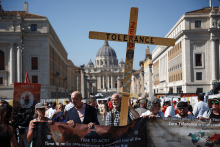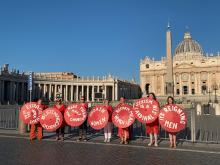Catholic Church

In early November, a group of faith activists gathered to discuss the future of the Catholicism and feminism.
The Women-Church Convergence, a historic coalition dedicated to justice in social and ecclesial structures, hosted 14 women and nonbinary people from across the country at Mount Olivet Conference and Retreat Center in Minnesota. As the organization begins to sunset, the gathering discussed how to make sure younger Catholic-rooted feminists are supported in their work.
In a short few months, I will pass a milestone and move into my sixth year of publicly living out my transgender identity. The years have indeed brought external changes—a deepened voice, new growth of facial hair, and a visible confidence. But more importantly, I finally know true happiness and peace.

Lent is typically a time when Christians engage in fasting or self-denial and reflect on the ways in which we need to repent. In the most unexpected place, a Nosferatu-themed party hosted by a friend of a friend, I encountered an opportunity to engage in the Lenten practice of repentance.
Within the Christian faith, at least within a formal church setting, there is a liturgical element that I’ve never experienced: the sacrament of reconciliation — a practice more commonly known as confession. Rather than sitting in a traditional confessional booth alongside an ordained priest, I made a confession while sitting in a random bedroom. A flimsy blue curtain divided me and the person playing the role of the priest. It was arguably irreligious, a party trick meant to satirize the Catholic Church.

EVERY 25 YEARS the global Catholic Church celebrates a Jubilee — and this is one of those years. Jubilee years are rooted in the biblical tradition from Leviticus, in which God mandates that slaves and prisoners be freed, debts forgiven, the land and creatures given rest, and relationships with our neighbors and with God set right. Pope Francis’ chosen theme for 2025 is “Pilgrims of Hope.” What does this mean for all of us, Catholic or not, who stand in the biblical tradition? Many of us, myself included,feel anxiety about what the next four years will bring. President Trump’s rhetoric and policies will likely result in attacks on immigrants, restrictions on LGBTQ+ people, heightened racial tensions, increased economic chaos, and dismantling advances in slowing climate change. Not just Americans are anxious. These actions impact people around the world.

A group of Catholic Church abuse victims and their advocates on Wednesday called on Pope Francis to enforce “zero tolerance” against clerical sex abuse, after completing a six-day pilgrimage to Rome carrying a large wooden cross.

I GOT TO spend a couple of days this autumn at the 25th annual Ignatian Family Teach-In for Justice — it was the first time I’d been there, and it cheered me immensely. Formed in the 1990s in response to the murder of Jesuit priests and lay leaders in El Salvador, it was originally held outside the School of the Americas at Fort Benning in Georgia, where the officer corps of often-repressive armies trained (including the Salvadoran military who murdered the Jesuits). Civil disobedience was often a feature of the Teach-In.
Now, it’s held in D.C., and mainly young people attend: a couple of thousand students at Jesuit high schools and colleges across the nation. This year’s participants were a diverse bunch, and extraordinary in the quality of their attention and engagement. I came away heartened, even amid the political chaos of the moment.

Kate McElwee, the executive director of the Women’s Ordination Conference and one of the women at the protest, spoke with Sojourners’ Mitchell Atencio about her hope for women’s ordination, Francis’ attitude toward reforms, and the symbolic nature of their activism.

Pope Francis said that while the Vatican’s secret and contested agreement with China on the appointment of Roman Catholic bishops is not ideal, he hopes it can be renewed in October because the church takes the long view.

The Vatican’s decision to have both Ukrainians and Russians take part in Pope Francis’ “Way of the Cross” procession on Friday has caused friction with Ukrainian Catholic leaders, who want it to be reconsidered.

Farmworkers in Palm Beach, Fla. are set to march five miles in protest of Wendy’s treatment of farmworkers, and their protest has received a blessing from the Archbishop Thomas Wenski.

When Philippine Catholic priest Father Nap Baltazar raised his hands to bless the people attending mass, the sleeves on his white vestment slid back to reveal a pink bracelet inscribed with the words “Let Leni Lead.”

Pope Emeritus Benedict XVI on Tuesday asked victims of sexual abuse in the Catholic Church for forgiveness but rejected allegations that he was involved in any cover-up. The retired pontiff was responding to an independent report, released on January 20, which chronicles decades of alleged abuse and misconduct in the archdiocese of Munich, which he led as Cardinal Joseph Ratzinger from 1977 and 1982.

A prominent liberal cardinal who leads a body representing European bishops has called for “fundamental revision” in Catholic teaching on homosexuality, and said it is wrong to fire Church workers for being LGBTQ.

Former Pope Benedict XVI failed to take action against clerics in four cases of alleged sexual abuse in his archdiocese when he was archbishop of Munich, a report found on Thursday.

Pope Francis on Monday condemned “baseless” ideological misinformation about COVID-19 vaccines, backing national immunization campaigns and calling health care a moral obligation.

FOR ARCHBISHOP JOSÉ Gomez of Los Angeles, social justice movements are “pseudo-religions.” In a November speech, Gomez said that “today’s critical theories” are “profoundly atheistic,” that they spring from a “Marxist cultural vision,” and that they “resemble” heresies in church history. He even blamed social justice movements for “causing new forms of social division, discrimination, intolerance, and injustice.”
Black Catholic theologians and others responded to Gomez’s remarks with a petition that read, in part, “Your speech was particularly painful and offensive to Black Catholic advocates in the United States who have organized for racial justice in the face of indifference and even hostility from many white Christians.” The National Black Sisters’ Conference pointed out that “BLM is not a pseudo-religion; nor is it a ‘dangerous substitute for true religion.’ It is a movement very much in the tradition of Catholic Social Teaching.” And someone ought to introduce Archbishop Gomez to Pope Francis who, in his message for World Youth Day this fall, encouraged young people to “Arise! Uphold social justice, truth, and integrity, human rights. Protect the persecuted, the poor and the vulnerable, those who have no voice in society, immigrants.”

Pope Francis said on Monday that migrants were being exploited as “pawns” on a political chessboard in an apparent reference to the crisis at the Belarus border.
Thousands of migrants are stuck on the European Union’s eastern frontier in what the EU says is a crisis Minsk (Belarus’ capital city) engineered by distributing Belarusian visas in the Middle East, flying them in and letting them go to the border.

The Supreme Court on Monday declined to hear a bid by a Catholic hospital in California to avoid a lawsuit over its refusal to let its facilities be used to perform a hysterectomy on a transgender patient who sought the procedure as a part of gender transition from female to male.
The justices turned away an appeal by Mercy San Juan Medical Center, a Sacramento-area hospital owned by Dignity Health, and let stand a lower court ruling that revived Evan Minton’s lawsuit accusing it of intentionally discriminating against him in violation of California law because he is transgender.
The justices on Monday also bolstered a Roman Catholic-led challenge to a New York state requirement that health insurance policies provided by employers cover abortion services. The justices told a lower court to reconsider its decision to throw out a bid by the Roman Catholic Diocese of Albany and other plaintiffs to widen an existing religious exemption to a 2017 state regulation that requires health insurance policies to cover “medically necessary” abortions.

President Joe Biden will meet with Pope Francis on Oct. 29 before attending a two-day summit of G-20 leaders in Rome where he hopes to reach agreement on a Global Minimum Tax of 15 percent, White House officials said on Thursday.
On the second foreign trip of his presidency, Biden will then attend the U.N. climate conference known as COP26 in Glasgow, Scotland, from Nov. 1-2 and announce “key actions” on the conference's top themes, including goals for fighting climate change and forest and land use, one White House official told Reuters.

Pope Francis on Sunday launched a two-year worldwide consultative process that could change the way the Roman Catholic Church makes decisions and leave its mark long after his pontificate is over.
Proponents see the initiative called “For a Synodal Church: Communion, Participation and Mission” as an opportunity to change the church’s power dynamics and give a greater voice to lay Catholics, including women, and people on the margins of society.
Conservatives say the three-stage process is a waste of time, may erode the hierarchical structure of the 1.3 billion member church, and in the long run could dilute traditional doctrine.